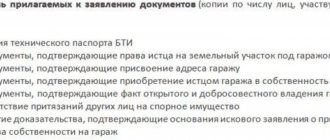Recognition of land ownership if you are the plaintiff
The simplicity or complexity of the legal process depends on who is the defendant in the case and on the availability of positive evidentiary documents (in your favor - example 1).
The defendant in the case may be government agencies, citizens or legal entities. Evidence is the most important thing in the process of proving your ownership or other right to land.
It is important for the judge to see indisputable evidence of your rights in the documents presented. If the documents are controversial or there is insufficient evidence, the court hearing may be postponed to obtain additional information; or they may refuse the claims. Therefore, it is important to think before filing a claim - how to prove your right to a land plot?
The right of ownership, lease, or use in some cases can be proven in different ways, and the applicable rules of law depend on which path is most appropriate and convenient for judicial protection. Consult an attorney in advance.
A separate category of cases includes disputes over inheritance of land plots. Much depends on whether the heir used the land plot, developed it, was a co-owner, with whose money the property was purchased, etc. You can read some of the answers below in the section on judicial practice; you will find other answers on other pages of our website.
Recognition of land ownership if you are the defendant
Most often, defendants include citizens who unknowingly violated the rights of the plaintiff (for example, they bought a land plot using documents that do not correspond to reality - example 1) or deliberately commit actions of the legality of which they were confident, or rely on the loyalty of the other party (for example, plaintiffs in In such situations, government bodies may act on issues of unauthorized seizure of plots, encumbrance of easements, seizure of land plots for state needs or in connection with the expiration of the provision period.
Due to the adversarial nature of the process, proving the correctness of each of the parties lies specifically with the representatives of these parties. Once again I would like to repeat that the results of the case depend on the evidence base, erudition and experience of the lawyer in this matter.
Grounds for filing a claim for inheritance
Causes of action are circumstances that force and allow a person to go to court with facts and evidence to support the circumstances. A lawsuit is a person’s reaction to a violation of his legal rights.
Situations that force you to file a claim to recognize your inheritance rights in court are as follows:
- Upon actual acceptance of the inheritance. The heir takes an active part in the life of the testator, runs a joint household, participates in repairs and bears the costs of maintaining the object of inheritance. After the sudden death of the owner, he remains in the living space and continues to lead his usual lifestyle. If the heir is a close relative of the deceased, this situation is called actual acceptance of the inheritance. But to register ownership rights to inherited property, you must obtain a certificate of inheritance. To do this, you must submit a corresponding application to a notary. If a notary refuses to issue a certificate of inheritance, it becomes necessary to file a lawsuit in court.
- The second common case is that the testator did not properly register the property. Rosreestr does not have information about the property, and the notary is forced to refuse to issue a certificate of inheritance. A claim is filed to recognize ownership of the land.
- The third situation assumes the presence of several heirs and their lack of a common opinion on the procedure for dividing the inherited property. A lawsuit and trial will help resolve the dispute.
The basis for filing a claim for inheritance may be the refusal of a notary.
Russian civil legislation provides for two methods of inheritance:
- in a notarial manner;
- judicially.
NTVP "Kedr - Consultant"
LLC "NTVP "Kedr - Consultant" » Services » Legal consultations » Land issues: plots, boundaries » On violation of the rights of the owner of a land plot on which a power line support was erected without his consent
Citizen P. is the owner of a land plot (category - individual housing construction), the ownership right is registered, there is a certificate of state registration of the right. Within a year after the acquisition, P. did not actually use the land plot, after which P. discovered that a high-voltage power line support had been installed on the territory of his plot, supplying electricity to residential buildings on the newly formed land plots. Having contacted the administration of the locality, P. learned that the work was carried out by the IDGC Votkinsk Distribution Zone branch, and it was not possible to coordinate the work with him, as the owner of the site, allegedly due to the lack of his contact information.
Question.
Can the owner of the P. plot count on any compensation, including: a reduction in land tax; compulsion to establish an easement; compensation for losses associated with the construction of a linear facility; requirement for the demolition of an unauthorized linear facility?
The term “land easement” means the right to limited paid or gratuitous use of someone else’s plot of land, granted to third parties. For example, the developer of a house needs to install water supply (gas pipeline or other) and this can only be done through someone else’s plot of land, which has a legal owner (owner). To install the required communications, an encumbrance in the form of an easement is established on this plot of land, according to which the interested party can use the part of the plot determined by the agreement, and the owner of the land plot has the right to receive agreed payments as compensation.
Lawyer's answer.
Land tax is regulated by Chapter 31 of the Tax Code of the Russian Federation. Payers of land tax, as a general rule, are citizens and organizations that own land plots on the basis of ownership, permanent (perpetual) use or the right of lifelong inheritable possession (clause 1 of Article 388 of the Tax Code of the Russian Federation).
According to the letter of the Ministry of Finance of Russia dated April 23, 2009 No. 03-05-05-02/23, since Chapter 31 of the Tax Code of the Russian Federation does not define the specifics of taxation of land plots, part of which is burdened with an easement, the owner of such a land plot is recognized as a payer of land tax in relation to all land plot, including that part of which is burdened with an easement. That is, the establishment of an easement will not affect the amount of tax payments paid.
At the same time, it should be noted that the base of the land tax is the cadastral value of the land plot (clause 1 of Article 391 of the Tax Code of the Russian Federation), which can be set at the market value (clause 3 of Article 66 of the Land Code of the Russian Federation). Establishing the cadastral value of real estate at the market value is advisable in cases where the cadastral value exceeds the market value. The practice of establishing the cadastral value in the amount of the market value on the basis of assessment reports is currently widely used.
Encumbering a plot with an easement inevitably entails a reduction in the market value of such a plot. In this case, establishing the cadastral value at the market value will lead to a reduction in land tax. However, it is important to take into account that savings on tax payments must exceed the costs associated with: preparing a report on determining the market value of a land plot, preparing a conclusion from a self-regulatory organization on such a report, as well as legal support for the procedure for establishing the cadastral value in the amount of the market value and in an administrative or judicial manner . Taking into account the amount of land tax paid by citizen P., the real savings from reducing the land tax will be small; the invested costs will pay off no earlier than in 10 years.
On the establishment of an easement.
Previously, the courts believed that the owner of a land plot did not have the right to go to court with a demand to establish an easement. According to paragraph 1 of Article 274 of the Civil Code of the Russian Federation, the owner of real estate (land plot, other real estate) has the right to demand from the owner of a neighboring land plot, and, in necessary cases, from the owner of another land plot (adjacent plot) to grant the right to limited use of the neighboring plot (easement).
Going to court with such a demand was considered an inappropriate method of defense and entailed a refusal to satisfy the stated demands. An analysis of existing judicial practice shows that at present some judges continue to adhere to this position (Appeal ruling of the Moscow Regional Court dated May 18, 2015 in case No. 33-11294/2015.)
However, the Constitutional Court of the Russian Federation, in its Ruling dated July 2, 2013 No. 1046-O, came to a different conclusion. In the said Determination Fr. The Constitutional Court came to the conclusion that the owner of a land plot has the right to apply to the court with a demand to establish an easement for persons using such a plot . The corresponding legal position is applied by the courts when making decisions (for example, resolution of the Arbitration Court of the Ural District dated August 17, 2015 No. F09-5219/15 in case No. A60-50038/2014).
It should be taken into account that before going to court in disputes about the establishment of an easement, a mandatory pre-trial settlement procedure . According to paragraph 3 of Article 274 of the Civil Code of the Russian Federation, an easement is established by agreement between the person requiring the establishment of an easement and the owner of the neighboring plot and is subject to registration in the manner established for the registration of rights to real estate. If no agreement is reached on the establishment or conditions of the easement, the dispute is resolved by the court at the request of the person demanding the establishment of the easement.
It is fair to note that despite the fact that the presence of a power line support on a land plot may not cause significant inconvenience to its owner, A.M. Permitin confirms their presence. you won't have to. The need to confirm violations of the plaintiff’s property rights, not related to deprivation of possession, is characteristic of claims based on the provisions of Article 304 of the Civil Code, which, however, cannot be applied to grant this person the right to use someone else’s land plot and thus replace a claim for the establishment of an easement , provided for in Article 274 of the Code" (resolution of the Presidium of the Supreme Arbitration Court of the Russian Federation dated February 28, 2012 No. 11248/11 in case No. A45-12892/2010).
The payment for the easement must be commensurate with the material benefit that the owner of the land plot could receive if the land plot were not encumbered by the easement (for example, the possible benefit from leasing part of the plot of land used for travel and passage to third parties.
There is judicial practice that uses, by analogy, the mechanism for calculating fees for easements, approved by Decree of the Government of the Russian Federation of December 23, 2014 No. 1461.
It is fair to note that in addition to the fee for establishing an easement, the owner of a land plot incurs losses as a result of placing a power line on the corresponding site, for which he has the right to claim compensation. It seems that the amount of such losses should be calculated as the difference between the value of a land plot with a constructed linear facility and the value of a land plot without such a facility. It is advisable to state this requirement together with the requirement to establish an easement.
In this situation (citizen P.), it is obvious that the amount of payment for the easement as well as the amount of compensation for his losses will be small.
On the question of whether it is possible to challenge the construction of a linear facility , current legislation provides such an opportunity to the owners of a land plot as part of filing a negative claim in court.
According to Article 304 of the Civil Code of the Russian Federation, “... the owner may demand the elimination of any violations of his rights, even if these violations were not associated with deprivation of possession.” At the same time, the legislation provides for such an opportunity not only for owners, but also for persons who own land plots on the basis of permanent lifelong inheritable ownership, economic management, operational management, or on another basis provided for by law or agreement (Article 305 of the Civil Code of the Russian Federation).
At the same time, the courts proceed from the fact that the laying of networks in itself does not prevent the use of a land plot (for example, in the Resolution of the Federal Antimonopoly Service of the West Siberian District dated April 14, 2010 in case No. A03-10886/2009). Some judicial acts state the position that the demolition of objects located on the site will entail a violation of public interests or the balance of interests of the parties. In the Determination of July 22, 2010 No. VAS-11943/09 in case No. A19-12924/2008, the Supreme Arbitration Court of the Russian Federation indicated that the court rightfully recognized that the claim is not subject to satisfaction, since its satisfaction would entail a violation of the rights and legitimate interests of other persons, as well as public interests".
At the same time, when the defendant in the case is a private person, and the public interests of an indefinite circle of persons (electricity consumers) are not discussed, the courts side with the plaintiff. The Supreme Court of the Republic of Bashkortostan, in an appeal ruling dated October 28, 2014 in case No. 33-13473/2014, ordered the defendant, at his own expense, to demolish a concrete pole/support of a high-voltage power line that was unauthorizedly installed on a land plot, since on the part of the defendant, in the conditions of the designated work, the installation of the power line violated the rights of the plaintiff.
Thus, taking into account the actual circumstances of the violation of the rights of Permitin A.M. construction of a controversial power line support on his land plot, it should be noted that the likelihood of a court decision to move the power line support is low.
As a result, citizen P. was asked to send the owner of the linear object a draft agreement on the establishment of an easement, since for the corresponding category of disputes a mandatory pre-trial procedure for resolving the dispute is provided. If it is not possible to reach an agreement on the establishment of an easement, you should go to court with a demand for the establishment of an easement and compensation for losses.
Consultation was given in November 2021 as part of the Republican competition “Professional Lawyer 2016”.
Consultant - Alexey Vladimirovich Sobolev, lawyer at Law Firm Business Analytics LLC, tel., mail
Showing 0 - 0 of 0 News | Page 0 of 0
No entries found.
Showing 0 - 0 of 0 News | Page 0 of 0
Ownership rights by acquisitive prescription
The method of obtaining property rights is provided for in Art. 234 Civil Code of the Russian Federation. The main condition is the fact that acquisitive prescription has occurred.
For state registration of property rights, it is necessary to confirm the fact of open, bona fide and continuous ownership of property:
- real estate for 15 years;
- other property for 5 years.
A person referring to the recognition of ownership by acquisitive prescription, when providing evidence confirming the period of ownership of the property, has the right to add to his period of ownership of the land plot the entire period of ownership of the person whose legal successor he is.
When operating the property, the following conditions must be met:
- conscientiousness in the use of the plot implies that the land plot is used without infringing on anyone’s legal rights;
- the use of the site for one’s own purposes is open with the possibility of confirming this with testimony;
- the period of use is at least 15 years;
- continuity of use: the site must be in use continuously throughout the entire period of ownership.
Compliance with all of the listed conditions for ownership of the plot provides the applicant with the opportunity to prove the right to state registration of ownership of the plot.
Legal regulation
Recognition of property rights is a legal procedure and must be carried out in accordance with current regulations. There is a huge variety of legislative norms and each regulates certain areas:
- First of all, this is the Land Code of the Russian Federation. Thus, Article 39.1 establishes the ways in which grounds arise, and Article 39.20 determines the features of the provision of land owned by the state or municipality;
- Civil Code of the Russian Federation. Ownership of land is established by Chapter 17;
- Federal Law No. 218-FZ of July 13, 2015 “On State Registration of Real Estate”;
- Federal Law No. 221-FZ of July 24, 2007 “On cadastral activities.” Defines relations related to cadastral registration and land surveying, which may be necessary when implementing the property recognition procedure.
Materials from judicial practice are also important, since recognition of rights is carried out through the court. They will help determine whether the situation has a prospect, whether it is worth starting the process or whether it is better to look for other options for solving the problem.
Link to document:
Link to document:
Link to document:
How to recognize ownership of SNT land through court
Conditions for recognition of ownership of a land plot in the SNT:
- the territory for a gardening, gardening or dacha non-profit association was allocated before the Federal Law came into force on April 15, 1998;
- the person applying for ownership of the plot was a member of this partnership.
Documents confirming the right to own garden plots allocated before January 1, 1991:
- decisions of authorities on the provision of plots, acts of transfer of plots for use;
- evidence of their transfer, or entries in land and economic books confirming the allocation of garden plots for collective use.
On July 21, 1997, Federal Law 122 came into force. Grants the right to citizens who are members of non-profit organizations to receive a plot of land provided to them for use by the organization's project free of charge.
Judicial practice has accumulated experience in dealing with such cases, but it is ambiguous. Some courts came to the conclusion that the plots allocated by the partnership, which were not registered in the cadastral register and did not have a cadastral number, were not formed as objects of law. Ownership of them cannot be registered.
Some court decisions satisfy claims for recognition of ownership of land plots in St.
Owned land - what does it mean? Concept and features
Ownership of land allows the owner not only to use it at his own discretion and the type of permitted use: to cultivate, harvest, raise livestock, build housing and other real estate, but also to sell, donate, lease or otherwise dispose of it. The main thing is that all these actions should not violate the laws of the Russian Federation, the rights of other citizens, organizations and the state .
Each land plot, like any real estate, requires a special accounting procedure. Information about transactions with land (transfer of rights) is entered into the registration database. At the moment, this is being done by Rosreestr, but previously the information could have been recorded by other bodies. In addition, each site has its own legal nature and corresponding specifics. That is, it could be obtained on the basis of perpetual use, inherited ownership, acquired as a result of transactions or, for example, withdrawn from forest lands, etc.
This is where land conflicts arise. They can appear not only due to contradictions that have arisen in the information about land entered into the Rosreestr databases and requiring recognition of the ownership rights of a person. Being the owner of the land legally, in fact you can receive, along with the acquired right, disputes about its boundaries, or claims to part or the entire land plot from third parties. Conflicts often arise due to the inability to realize existing rights to the plot (arrests, encumbrances, etc.) when someone does not recognize the owner’s right to the land.
In such cases, a way out of deadlock situations is civil and land legislation, which provides for the opportunity for the owner of a plot to recognize his right through the court .
However, each situation has its own characteristics.
Sample application and rules for drawing up
In order for a claim for recognition of ownership of a land plot to be accepted in the office of the court, it must meet certain requirements and comply with the established form.
READ Claim for recognition of ownership of a house: sample, state duty
Procedure for filing a claim:
- The name of the court to which the plaintiff is applying.
- FULL NAME. the person filing the claim.
- Statement of the essence of the violation or threat of violation of the rights of the plaintiff.
- Describe in detail the evidence in support of the circumstances specified in the application.
- Formulate your requirements.
- Inform the court of your place of residence.
- If there are authorized representatives, please provide their full details.
- Documents confirming the terms and fact of ownership of the land plot are attached to the application; a list of them is compiled at the end of the application.
- Date when the claim was filed, signature with full name.
- The application is drawn up in two copies, one for filing, the second for the court to mark the acceptance of the application. For ease of writing, you can use the sample posted on the website.
Peculiarities of consideration of cases of this category
Issues are resolved by courts of general jurisdiction, that is, city or district courts.
The price of the claim is calculated based on the value of the land plot, the rights to which must be recognized. The most profitable and simplest option is to use inventory or cadastral data, but you can also turn to an appraiser for help. Persons who can also lay claim to the object are indicated as the defendant. If they are absent, then the property could potentially be considered escheated and the municipal administration would be the defendant. If the actions of Rosreestr or another body are disputed, then they act as the responding party.
The result of the consideration of the case is a court decision, which states that the citizen’s property rights are considered recognized. Subsequent registration is carried out on the basis of such an act.
Documents for going to court
In addition to the statement of claim, a number of documents will be required. The full list is given in Article 132 of the Code of Criminal Procedure.
- A receipt for payment of the state fee or a petition for exemption from its payment, a reduction in the amount of the fee, or the provision of a deferment or installment plan;
- in cases where the law provides for a pre-trial procedure for resolving a dispute, it is necessary to submit documents indicating its compliance (letters, etc.);
- documents confirming the circumstances on which the plaintiff’s claims are based. These include contracts, letters, etc.;
- documents confirming the authority of the plaintiff;
- if the claim is disputed or money is being recovered, a calculation signed by the plaintiff is attached, the number of copies must correspond to the number of defendants and third parties;
- if one of the parties took measures to achieve reconciliation, then the court must provide evidence of these actions;
- documents confirming the sending of the statement of claim and the materials attached to it to other participants in the case;
If the claim is sent for the purpose of registering an inheritance, add to the above list:
- a will or documents confirming family ties with the deceased;
- death certificate, documentation on the composition of inherited property;
- refusals of a notary: in opening an inheritance, issuing a certificate of the right to inheritance, issuing a certificate of right to an actually accepted inheritance;
- documents to restore the period for accepting an inheritance must confirm the validity of the reasons: certificates proving a serious illness, a long business trip abroad or leaving the region of residence, documents confirming being in a helpless state.
Compliance with this list is important, because after the claim is accepted by the office, the judge may return the statement of claim or leave it without movement.
Amount of state duty and limitation period
The amount of state duty depends on the value of the claim. When determining the value of a real estate object or land plot, its inventory value according to the BTI database is taken as a basis.
The state duty can be calculated independently on the court’s website in the “state duty calculator” section. A receipt for payment of the state fee is a mandatory document attached to the statement of claim.
The general statute of limitations for civil cases is 3 years.
A claim for recognition of property rights by acquisitive prescription can be filed in court after 15 years of open, fair and continuous use + 3 years of limitation period = 18 years.
Procedure for recognizing the right to a land plot
The exact course of action will differ in each situation. It is necessary to carefully study the circumstances and judicial practice. Then you need:
- contact the primary registration authority. Most often this is Rosreestr. That is, you need to try to register the object in a standard manner;
- be denied registration;
- collect a package of documentation that differs depending on the case;
- prepare a statement of claim, indicating all the necessary information;
- obtain a court decision;
- contact Rosreestr and register based on the decision received.
Rosreestr will no longer be able to refuse registration if the judicial act comes into force.
Remember that the outcome of the case may depend on the correctness of the statement of claim . If you need help preparing documents, please write about it using the form below.





